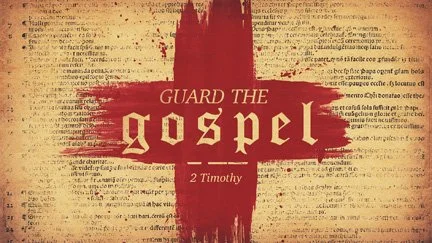This is not the sermon I had planned to preach today. But when I made my preaching schedule up a few weeks ago, I didn’t know what was going to happen in the past week or so. I didn’t know that, once again, we would be in national mourning due to yet another – no, two other – mass shootings in the United States. I didn’t know how angry and how deeply sad I would feel a week later.
But here we are again. My heart is heavy with grief, my mind is churning to find explanations or answers or solutions to a complex problem, and I know that at least some of you must feel the same way I do. I asked myself, “Is there a word from God for today? What passage in scripture might speak to what I am feeling and to what we are living through?”
I eventually remembered this passage from Matthew chapter 2. We read part of this passage on Epiphany Sunday, when we remember the Wise Men coming to worship baby Jesus, but we hardly ever read the end of the story. It is one of the most violent, haunting passages in all the Bible. And it is not a story that is either comfortable or comforting. But it is one that I think is appropriate for this week. Because, like Rachel weeping for her children, I refuse to be comforted, especially not by more “thoughts and prayers” from politicians who have neither the character nor the backbone to stand up and do something about common-sense gun control in this country, legislation that is supported by over 90% of the population, but opposed vehemently by the NRA.
As the years have gone by since the shooting at Sandy Hook Elementary School in December of 2012, when 27 people, mostly youngsters, were killed, I have been amazed and sickened at the lack of some national response to the crisis of gun violence in America. The names of the places are cemented in my heart and mind: a movie theater in Aurora, Colorado; the Navy yard in Washington, D.C.; a workplace in San Bernadino, CA; a church in Charleston, SC; the Pulse Nightclub in Orlando, FL; a concert venue in Las Vegas, NV; a Baptist church in Sutherland Springs, TX; a high school in Parkland, FL; a Waffle House in Nashville, TN; a school in Santa Fe, TX; a newspaper office in Annapolis, MD; a synagogue in Pittsburgh, PA; a nightclub in Thousand Oaks, CA; a hospital in Chicago, IL; a hotel bar in State College, PA; a municipal building in Virginia Beach, VA; a garlic festival in Gilroy, CA; a Wal-Mart in El Paso, TX; and an entertainment district in Dayton, OH. In just those shootings, there have been 318 people killed and 854 injured.
Clearly, we have a problem in this country. And we have to be honest and call it what it is. We have a problem with gun violence. And that violence is often based in hatred and in fear. That is why I thought about this passage from Matthew. It is about what can happen when fear and hate are allowed to take hold.
The Jewish people had been looking for their Messiah for hundreds of years. They were living under the tyranny and oppression of first one empire and then another. By the time of the birth of Jesus, they had been under the thumb of the Roman Empire for a very long time. The people were expecting a Messiah, or deliverer, who would be an earthly king, and who would lead them in overthrowing their Roman oppressors. When the Wise Men came from the East looking for the Messiah, or King, whose star they had seen, they went to the palace of King Herod. When you are looking for a newborn king, it makes sense to go to the palace. That is where you would expect to find a baby king.
But, of course, Jesus was not the son of Herod, and was not born in the palace. Herod knew there was no baby king living under his roof. So he deduced that the Messiah had been born and that he could possibly rise up to become the king. That meant that Herod’s position was threatened; this new king would take his place, and his power, and his throne. So he plotted his next move carefully. Herod told the Wise Men to let him know when they found the king, and tell him where the king was, so that he could go and pay his respects. And he sent the Wise Men on their way. Of course, paying his respects was not what King Herod intended at all. He intended to do away with the threat to his position while he was too young to fight back.
But the Wise Men did not return to King Herod’s palace to make their report on the whereabouts of Jesus. They had been warned in a dream that they should not do that, so they had just gone on their way, heading home by another way. Well, when Herod realized what had happened, he was furious. His heart was full of hatred and fear for this child who could take away his power and position. So he ordered that all children aged two years or younger living in or around Bethlehem should be killed. Since he didn’t know which child was the Messiah, he just killed them all. And the response of the people was the fulfillment of a prophecy made by Jeremiah centuries before: “A cry of anguish is heard in Ramah – weeping and mourning unrestrained. Rachel weeps for her children, refusing to be comforted – for they are dead.”
I don’t know of any greater loss that people can suffer than the loss of a child. It is a pain that only a parent could really understand. And this morning, I am aware that every one of those people killed in mass shootings in this country was somebody’s child. There are parents all across our nation who are grieving today because their child’s life was snuffed out by a gunman. Black and white and Hispanic, young and old, men and women, gay and straight, these victims were all somebody’s children. They are all God’s children. And we, who are also God’s children, ought to have something to say about it.
In my mind, this is not a political issue. This is not about whether you are a Republican or a Democrat, a gun owner or a pacifist, a conservative or a liberal. It is not about our Second Amendment rights. It is about the right of every American citizen to feel safe going to church or synagogue, going to a concert, going to school, going to WalMart or a nightclub or a festival. It is about the need for our government to find some way to protect its citizens so that they can enjoy life, liberty, and the pursuit of happiness without having to be afraid that someone will show up with a semi-automatic weapon and shoot them dead.
I could spend a long time talking about the need for gun control legislation. We have several bills in New Hampshire right now that are waiting for the governor’s signature. And there is legislation in the U.S. Congress that has languished for months and years. After all, there are more guns in the U.S. than there are people. I could rant about racism, and the hateful rhetoric that seems to be encouraging people on the fringe to do crazy things like commit mass killings. Or I could even focus on homophobia, the root of the Pulse Nightclub shootings and other acts of violence every year. But beneath all of those other issues, I think, is the issue of fear. People are afraid of anyone who is different from them. People are afraid of that which is different, that which is unknown, that which appears to threaten them in some way. We fear people who are not like us, because we think they are going to put us in danger, or threaten our way of life, or make us uncomfortable. Just like King Herod, we begin to think about how to protect ourselves, protect our beliefs, protect our power or position.
As a child growing up in the South, I absorbed those fears. I don’t remember anyone teaching me to be afraid of black men or homosexuals, but I certainly knew that I was supposed to be afraid of them. I saw women hold their purses closer to their sides when walking past a black man. I heard people worry when groups of black people would gather together. I heard religious people talk about how homosexuals would try to convert children to their ways, and how they were all sinners who were going to hell. And people who were afraid were also teaching hate. If those who were different were a threat, then it was “normal” to hate them. And that hatred could, and often did, lead to violence. I remember race wars taking place in my high school. There was one week when many white and black students stayed home because of violence between rival white and black drug gangs who fought every day.
How do we un-learn those fears? How do we turn off the hate? How do we address the hateful language of intolerance and bigotry that is being tossed around every day, even from our own elected officials, feeding the anxiety and hatred of others?
We replace the hate and the fear with the love of Christ. It is that simple. It is that hard. We begin to see other people as sisters and brothers, not as threats or enemies. We begin to recognize that differences are not the same thing as threats. We get to know people of other religions, other races, other sexual orientations. We refuse to stereotype. We refuse to make assumptions. We ask ourselves, how can we address the real issues without becoming hostile towards people who have different opinions? We work for justice for all people in our country, and we support the law enforcement community, whose members put their lives on the line every single day to keep us safe. We work to build understanding and acceptance, and we denounce violence as a proper response to anything. We reach out to those who feel threatened, and we also reach out to those who feel threatening to us. There is no possibility of making this problem go away by ignoring it.
The church must speak out and speak loudly, and reclaim our voice in the public sphere. We must confront those who are using hate speech as a political tactic and demand better behavior. We must hold those accountable who are inflaming those with white supremacist and racist beliefs and who are taking violent actions. We have a gospel that compels us to love our enemies, and that means those who hold different political views than we do. If our elected officials can’t learn to talk to each other with respect and integrity, and work together to address the issue of gun violence in responsible ways, then we are truly doomed to see this happen over and over and over again. This past week, the United Methodist Board of Church and Society called on all Methodists to email their senators urging them to pass the Background Check Expansion Act. And I think it is important for us to be active politically and socially. We must follow the example of Jesus Christ, who was courageous enough to speak truth to power and compassionate enough to work for justice every day of his life.
One of the men I most admire is Elie Wiesel, Holocaust survivor, teacher, and author. He died just a few years ago. He was just 15 years old when his family was deported by the Nazis to Auschwitz. His mother and his younger sister were killed the day they arrived. Elie and his father were transported to Buchenwald, where his father died shortly before the camp was liberated in April 1945. After the war, Elie studied in Paris and became a journalist. He was the author of more than 60 books, including the classic Night, which was based on his experiences in the concentration camps.
Wiesel was a devoted supporter of Israel, and also defended the cause of Soviet Jews, Nicaragua’s Miskito Indians, Argentina’s Desaparecidos, Cambodian refugees, the Kurds, victims of famine and genocide in Africa, of apartheid in South Africa, and victims of war in the former Yugoslavia. Teaching was always an important part of his work, and since 1976 he had been a professor at Boston University. He was a member of the faculty in the department of religion as well as the department of philosophy. For his literary and humanitarian activities, Wiesel received the Presidential Medal of Freedom, the U.S. Congressional Gold Medal, the National Humanities Medal, the Medal of Liberty, and the Nobel Peace Prize.
Elie Wiesel saw the worst that humanity had to offer in those Nazi death camps. But he did not end up a broken man, bound in hatred or fear. Instead, he used his life to speak up for others who were suffering from oppression or violence. He did this without allowing hatred to fill his heart. He said in an interview, “I had anger, but never hate. Before the war, I was too busy studying to hate. After the war, I thought, What’s the use? To hate would be to reduce myself.”
I don’t know what the answers are in our country right now as far as eliminating mass shootings and gun violence. I can do some things about my own opinions, in terms of contacting my representative and senator to let them know how I feel about some issues. But I do know that I will not let hate take root in my heart, not hate at the shooters, not hate at the politicians that refuse to take action, not hate toward anyone. Because hate would reduce me. I believe in the gospel message that love is stronger than hatred, that goodness is stronger than evil, and that God is in control. I have to believe that. If I can’t believe that, I don’t think I would have any hope at all.









